Mistakes happen — especially when health care providers don't have a complete picture of your medical history.
Prevent Medical Errors With Health Records
Looking to reduce the risk of medical errors? Communicating with your family doctor is key — and so is keeping accurate health records.
Medically reviewed by Lindsey Marcellin, MD, MPH

You can lower the risk of medical errors for yourself and your children by communicating more efficiently with your family doctor and by keeping up-to-date health records.
Preventing Medical Errors: Get Involved
The doctor's office is no place to be shy. Instead, speak up about your or your child’s symptoms, ask plenty of questions, and be part of the decision-making process regarding your family’s health.
The more information your family doctor has about your health, the better he can treat you and prevent medical errors. Start by giving your family doctor an accurate health history.
Preventing Medical Errors: Keep a Health Journal
It’s not easy to remember if your tetanus shot was 7 or 10 years ago or whether Aunt Sally had osteoporosis or osteoarthritis. That’s why it’s a good idea to keep health records in a health journal.
The more accurate information doctors have on their patients, the better the chance that an error, such as prescribing a drug that can cause an allergic reaction, won’t happen, says Thomas J. Vento, MD, a family doctor in private practice in Reisterstown, M.D.
It’s a great idea to give your family doctor a copy to keep in his file, but it’s also very important to have your own copy of the health journal in case of a medical emergency, Dr. Vento says. Here’s what to include:
- The exact names and dosages of medications, supplements, and vitamins each family member takes
- A list of drugs each family member is allergic to
- Dates of immunizations
- Medical tests and dates, such as a mammogram or colonoscopy
- Details about any hospitalizations
- Any family history of major health conditions, such as cancer, heart disease, stroke, diabetes, and arthritis
Keep all your doctors informed. Share your health journal with your family doctor or pediatrician, but don’t stop there. Be sure to give a copy to any of the specialists you see.
Preventing Medical Errors: Ask Questions About Treatments
Another part of preventing medical errors is making an effort to understand any treatment your family doctor prescribes. Bring a pen and paper with you to office visits and take notes — it’s easy to forget directions when you are trying to absorb a lot of information. “Make sure you know what the doctor’s doing before you leave the office,” Vento says. If not, you may find yourself walking out and not knowing what’s happening.
If your doctor prescribes a medication, be sure to ask what the medication is for, how you should take it — such as with meals, if you should expect side effects, and if you need to avoid drinking alcohol, driving a car, or altering your schedule in any way while taking the drug. Find out if it is safe to take with other prescription and over-the-counter medications you’re already taking.
Look at the prescription. Can you read the handwriting? If you can’t, the pharmacist might not be able to either. Make sure it’s your name on the prescription and that it’s for the right medication. And once you get that script filled, verify the information on the bottle or package.
Preventing Medical Errors: Other Tips
Just as you take the time to thoroughly understand any medication you are being prescribed, take the same steps when your doctor recommends any course of treatment, whether it’s surgery or a medical test. Be sure you understand why you need it and the pros and cons of having it.
Today doctors and pharmacists use electronic medical records that can catch mistakes before they happen, so medical errors occur less and less, Vento says. But being an active voice in health care is an integral part of getting the best care you can for yourself and your children.
From:

No comments:
Post a Comment